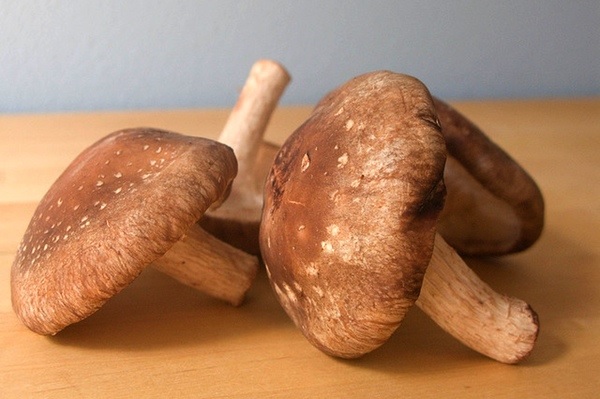The Shiitake (Lentinula edodes) is an edible mushroom native to East Asia, which is cultivated and consumed in many Asian countries. Shiitake mushrooms are the second most commonly cultivated edible mushrooms in the world. It is a feature of many Asian cuisines. It is also considered a medicinal mushroom in some forms of traditional medicine. Extracts from the mushroom and sometimes the whole dried mushroom are used in herbal remedies.
The species was formerly known as Lentinus edodes and Agaricus edodes. The name shiitake originates from its Japanese name, shiitake. Other common names by which the mushroom is known in English include "Sawtooth oak mushroom", "black forest mushroom", "black mushroom", "golden oak mushroom", or "oakwood mushroom".
Studies in animals have found antitumor, cholesterol-lowering and virus-inhibiting effects in compounds in shiitake mushrooms. However, clinical studies are needed to determine whether these properties can help people with cancer and other diseases. It is reasonable to include shiitake mushrooms as part of a balanced diet. The mushroom not only used as a food but it also having medicinal properties, taken as a remedy for upper respiratory diseases, poor blood circulation, liver trouble, exhaustion and weakness, and to boost up immune system. It was also believed to prevent premature aging. Shiitake are also dried and sold as preserved food. These are rehydrated by soaking in water before using.
For medicinal purposes, the extracts of compounds in shiitake mushrooms would usually be recommended, rather than the mushroom itself. For example, some Japanese researchers give lentinan along with chemotherapy to treat patients with lung, nose, throat and stomach cancer. Extracts of the active compounds, such as lentinan and eritadenine are mainly sold in Japan. Activated hexose-containing compound is sold as a nutritional supplement in the United States, Europe, and Japan. Shiitake mushrooms are promoted to fight the development and progression of cancer and AIDS by boosting the body's immune system. These mushrooms are also said to help prevent heart disease by lowering cholesterol levels and to help treat infections such as hepatitis by producing interferon, a group of natural proteins that stops viruses from multiplying. Promoters claim that eating both the cap and stem of the mushroom may be helpful, but they do not say how much must be eaten to have an effect. They say the strength and effects of the mushroom depend on how it is prepared and consumed.
Promoters claim that shiitake mushrooms contain several compounds with health benefits. A compound called lentinan is believed to stop or slow tumor growth. Another component, activated hexose-containing compound (also known as 1,3-beta glucan), is also said to reduce tumor activity and lessen the side effects of cancer treatment. The mushrooms also contain the compound eritadenine, which is thought to lower cholesterol by blocking the way cholesterol is absorbed into the bloodstream.
Now, Farmers have started growing Shiitake mushrooms (Lentinula Edodes) having medicinal qualities at Solan in Himachal Pradesh. The farmers have started growing Shiitake mushrooms in the area after the scientists of the Directorate of Mushroom Research in Chambaghat in Solan, proved them of having anti-cancer and anti-HIV agents. In the first stage, the scientists gave the mushroom spawns to the farmers on trial basis. The farmers were successful in growing these medicinal mushrooms. These mushrooms have extensive medicinal qualities. They help to improve the immune system and also contain anti- viral, anti- bacterial and anti-fungal agents.
